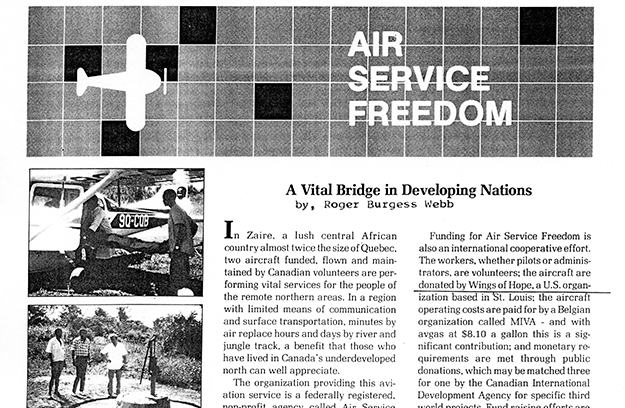Date: December 1986
By: Roger Burgess Webb
Magazine: Air Line Pilot
Page: 29
In Zaire, a lush central African country almost twice the size of Quebec, two aircraft funded, flown and maintained by Canadian volunteers are performing vital services for the people of the remote northern areas. In a region with limited means of communication and surface transportation, minutes by air replace hours and days by river and jungle track, a benefit that those who have lived in Canada’s underdeveloped north can well appreciate.
The organization providing this aviation service is a federally registered, non-profit agency called Air Service Freedom (Avians sans Frontieres), founded in Montreal in 1984 to help the people of developing nations. In Zaire, Air Service Freedom operates two Cessna 206s, flown by Pierre Lajeunesse, Phoebe Kingscote and Robert Fleury. They are kept busy transporting the sick and injured, delivering school supplies and teachers’ payrolls to isolated settlements, carrying materials for community projects such as new water wells, and assisting in farming projects by bringing in seedlings, and so on. It is practical humanitarian aviation at its best, and with Zaireans being trained to take it over, the work will continue when Air Service Freedom moves on to help in other developing nations.
Funding for Air Service Freedom is also an international cooperative effort. The workers, whether pilots or administrators, are volunteers; the aircraft are donated by Wings of Hope, a U.S. organization based in St. Louis; the aircraft operating costs are paid for by a Belgian organization called MIVA – and with avgas at $8.10 a gallon this is a significant contribution; and monetary requirements are met through public donations, which may be matched three for one by the Canadian International Development Agency for specific third world projects. Fund raising efforts are headed by Guy Gervais, who himself has been flying in and out of remote areas in New Guinea, South America and Africa for almost thirty years (see “Wings of Peace, PILOT. Fall 1975); he has been speaking to service clubs and other groups around the country – with transportation courtesy of several of our airlines – and is a most interesting man, especially if one can get him talking of some of his experiences.
The humanitarian work of Air Service Freedom is essential to the people of developing nations, and proves once again the value of the airplane. If you can help, please contact Air Service Freedom or send your tax deductible contribution using the coupon below.
